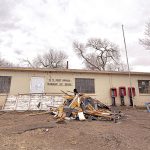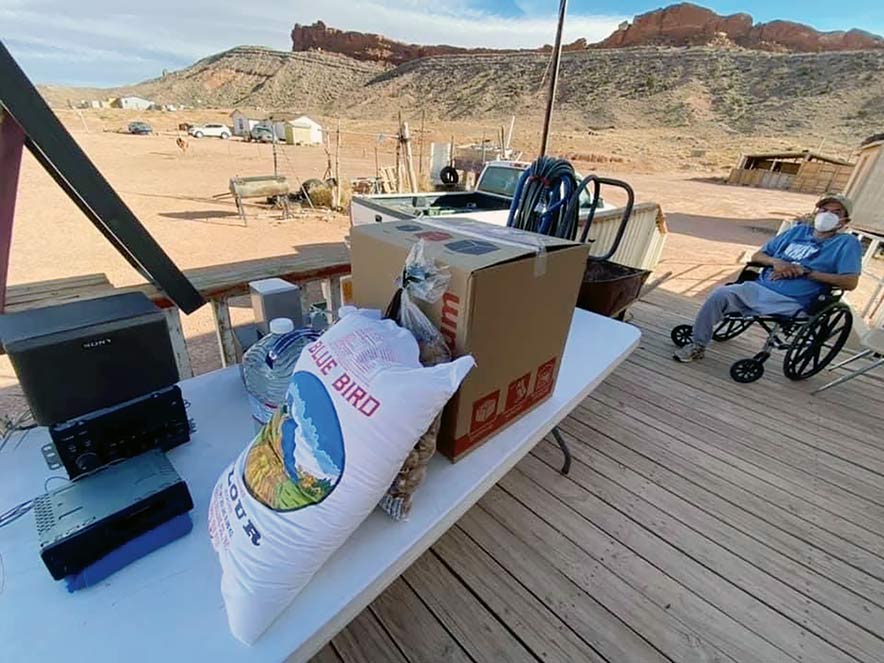
Navajo-Hopi relief group seeks funding to sustain services
WINDOW ROCK
At a time when COVID-19 cases are surging and lockdowns limit access to basic necessities, the Navajo-Hopi Families COVID-19 Relief Fund, which has served over 46,000 households and 186,000 individuals with humanitarian aid, will have to discontinue services in mid-December without an immediate influx of funding.

Courtesy photo | Shandiin Herrera
Shandiin Herrera and her family provide Kinship Care Packages to Darell Whitehorse in Kayenta.
Founder and Interim Director Ethel Branch said the group has never “slowed down or let up on their vigilance” in the fight against COVID-19 and dedication to protecting Navajo and Hopi families.
“Now, looking at the numbers, we realize we were getting close to spending through our reserves,” she said. “It’s very clear that we need additional assistance, particularly as we face this tsunami with the resurgence of COVID in our communities. We want to operate until a vaccine is widely available.”
In order to continue providing critically needed distributions of food, water, personal protective equipment, sanitation supplies and other essentials, the relief fund will be amping up its fundraising efforts necessary to sustain its operations.
‘A phenomenal thing’
Since mid-March, the relief fund has successfully raised over $6.2 million and has distributed over $5.3 million in food and PPE since Branch started the grassroots effort with a GoFundMe and the goal of bringing resources to Navajo and Hopi communities to help shield them from COVID-19. The primary objective of the relief fund has been to help mitigate the spread of COVID-19 by providing essential supplies to high risk and COVID-positive community members.
The group has also supplied PPE to frontline workers, including first responders, police officers, and health-care workers. “We are incredibly thankful for the overwhelming support that the public and the world have shown to our community,” said Branch. “So many times, Indigenous people are viewed as invisible and our issues don’t bubble to the top of the national radar. To have people in this country aware of what’s happening in our community and stepping forward to help is such a phenomenal thing.”
As a public service, the Navajo Times is making all coverage of the coronavirus pandemic fully available on its website. Please support the Times by subscribing.
How to protect yourself and others.
Why masks work. Which masks are best.
Resources for coronavirus assistance
Another $800,000 in PPE supplies and 17 tons of coal for the “elders heating program” are in the process of being deployed, said Deputy Director Cassandra Begay. PPE totes, including masks, sanitizer and Clorox wipes, will be distributed through the “PPE Pantry” program in a collaboration with Bashas’ Diné grocery stores in December.
The relief fund is led by 12 Navajo and Hopi women, including Branch and Begay, who manage volunteer teams, staging areas and distribution centers across the two tribal nations and in surrounding border towns. “None of this work would be possible without our over 100,000 donors and hundreds of volunteers,” said Begay. “They’ve been the backbone of our organization.”
New goal: $3.5 million
Branch said in the past few months, in anticipation of the “second wave” of COVID-19, the relief fund is focused on building capacity on top of distributing $150,000 to $200,000 in resources to communities across Navajo and Hopi every week.
“We have the capacity to spend a million dollars a month in bringing relief to our communities,” said Branch. “That’s my operational goal for December through the end of March.”
With that, Branch hopes to raise at least $3.5 million over the near term to sustain the relief effort through the spring. “We do not want our relatives to be in need of food, especially during the holiday season,” said Begay. “We hope through an additional infusion of resources we will be equipped with enough food and PPE for our communities to weather the flu and cold season.”
To fulfill their goal, the relief fund is making an urgent appeal for charitable contributions and asking donors to consider making a gift of any amount to the organization during the national nonprofit “Giving Tuesday” on Dec. 1.
“We ask that everyone look into their hearts and pledge what they are able to in order to help our communities through this continued crisis,” said Branch.
‘A scary time’
With only 16 hospitals, two medical clinics and 14 groceries stores across the Navajo Nation, along with high unemployment, poverty, and approximately one third of the population living without electricity or running water, the challenges of fighting the virus among populations that are most vulnerable are compounded.
“Without new funding, and with limited resources and an uncontrolled spread of the coronavirus on the Navajo and Hopi reservations, many of our community members are going to face grave health and life consequences,” said Begay.
Branch said with the surge of new cases, it is not a safe time for people, especially elders and immuno-compromised individuals, to be out searching for food. They should stay home and remain COVID-free, she said. “It will be devastating to our communities if we cannot continue providing food to our people during this time,” said Branch.
“This is the worst time to be running out of resources. It’s the holiday season. People want to be happy and secure and right now it’s a really scary time.”
Since the pandemic began, the relief fund has collaborated successfully with multiple foundations and relief organizations locally, nationally and globally to combine and leverage resources.
While the list is too long to publish in full, these include Air Serv International, Shamrock Foods, the Irish people, Can’d Aid, Jason Momoa, Kellogg Foundation, Vadon Foundation, Hopi Foundation, Santa Fe Community Foundation, NDN Collective, Sierra Club, Rainforest Action Network, IllumiNative, McCabe Consulting Group, Kinlani Mutual Aid, Utah Diné Bikeyah, Rural Utah Project, Bluff Area Mutual Aid, Utah Navajo Health System, Navajo Transitional Energy Company, Salt River Project, Bear Construction, Diné College and numerous Navajo Nation chapters and Hopi villages.
“In uncertain times, all involved in this international effort have found a way to connect across physical and cultural divides to preserve the culture and heritage of Navajo and Hopi families,” said Begay. “The relief team and our communities have been empowered to stage a profound battle against COVID over the last eight months through this generosity.”
In addition to welcoming a boost from individual donors who wish to support the organization, Begay said the NHFCRF team is hopeful foundations will offer additional financial support as well. “If we have to close our doors, I don’t know who’s going to pick up where we leave off,” she said. “That’s the scary part.”








 Highway 264,
Highway 264, I-40, WB @ Winslow
I-40, WB @ Winslow